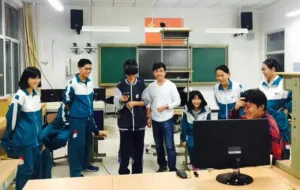A research report called “The Impact of VR on Academic Performance”, published in November 2016, was jointly carried out by Beijing Bluefocus E-Commerce Co., Ltd. and Beijing iBokan Wisdom Mobile Internet Technology Training at select high schools in Beijing.
According to HTC, which published a release, not only was VR-based education shown to improve student test scores and knowledge retention compared with traditional classroom education, but the study also provided clear confirmation that children who had tested below average in the pre-study test were able to outperform the test’s top scorers after having undergone a VR-enhanced curriculum.
The research was performed with a pool of 40 high school students evenly distributed to account for gender and prior academic achievement (above average, average, and below average) among the VR group and the traditional education group (the control group). The classes were taught by the same teacher to control for all factors, and the VR portion of the study was conducted using HTC Vive devices and Universe Sandbox content. The study uncovered strong evidence of improved performance when VR-based teaching methods were used to supplement the classroom experience. VR content was shown to significantly boost student learning and test scores, with those who had participated in the VR-based curriculum achieving average scores of 93% on the final test versus the average 73% achieved by those who had not.
The VR-enhanced curriculum was also found to improve learning comprehension and retention. A test was given two weeks after the end of the curriculum to measure knowledge retention, and the results clearly demonstrated that students in the VR group outperformed those in the traditional learning group. Students in the VR group scored an average of 90% while those in the traditional education group scored an average of only 68%. Students in the VR group saw their scores decrease by far fewer percentage points than those in the control group, signaling that VR-based education allowed students to achieve higher learning retention.
Furthermore, VR-based students who had tested “below average” on pre-curriculum tests achieved an average score of 88% on the final test, considerably outperforming the “above average” pre-test students in the traditional learning group, who scored an average of 76% on the final test. T
A student participant said, “I feel like I am in the middle of the universe. It’s so beautiful. I hope that VR can be available in my school as soon as possible – I will be extremely interested in the VR-based subjects.”
The report can be downloaded here.

